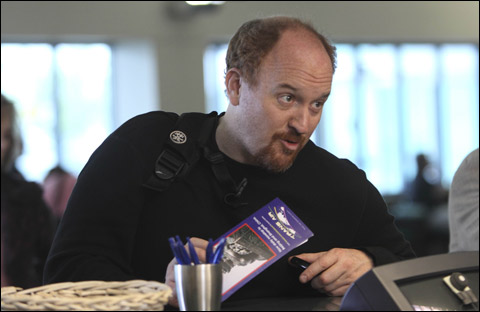
DOOMSAYER: Louie wrings more laughs out of social awkwardness and utter despair than any show since Ricky Gervais’s BBC version of The Office. |
Louis C.K.'s comedy is bleak. To him, the act of talking to a stranger is the first step on the path to some new misery. A new dog is a guarantee of sadness for your whole family when, after a few years, it inevitably dies. Even C.K.'s choice of an Infiniti makes him complicit in the deaths of thousands a day, since he could trade it in for something more modest and donate the difference in cost to various charities dedicated to stamping out world hunger. Bleak.
That outlook pervades his new show on F/X (Tuesdays at 11). Louie focuses on C.K.'s stand-up. That's followed by a sketch starring C.K. as a character similar to himself (both are recently divorced fathers of two young girls) that expands on the ideas he's joked about — it's not unlike Seinfeld, only without the wacky supporting characters, and with even less of a thread connecting each scenario. A bit about C.K. having to volunteer at his daughter's school leads to a segment where he chaperones a field trip that goes horribly wrong. Jokes about his divorce lead to a short about his reconnecting with a girl he used to like in high school (and who once asked him to "whip it out"). On paper, these bits may not sound like much, but when filtered through C.K.'s unfailing belief in imminent doom, they become simultaneously hilarious and tragic. Louie wrings more laughs out of both squirmy social awkwardness and utter despair than any show since Ricky Gervais's BBC version of The Office. Gervais even has a cameo in one episode.
C.K. has his hands in almost every aspect of the show: he wrote, produced, directed, cast, and even edited the two episodes that have aired. FX, it would seem, is happy to exchange creative control for the rights to broadcast the show on the relative cheap. That degree of creative freedom allows C.K. — a former writer for Conan O'Brien and Chris Rock, as well as the writer/director of the cult favorite Pootie Tang — to do pretty much what he wants without fear of network meddling. It also means that Louie already feels more fully-formed and self-assured than most first-season shows.
Here's an example of something that probably would not have flown on, say, NBC. The episode opens with C.K. playing poker with a group of other stand-up comedians. After a few jokes at one another's expense, the conversation turns to a discussion between C.K. and Rick Crom, a gay stand-up comedian, about C.K.'s use of the slur "faggot" in his act. C.K. doesn't offer any defense or justification, kneejerk or otherwise, and neither does he appear to be looking for validation from Crom. Instead, he seems both curious as to what his friend thinks and concerned that he might be offending people. And rather than attacking or dismissing C.K.'s concerns, Crom offers some reasons for why the word bothers people so much and then goes into the history of how that word came to be associated with that connotation.
It's a more nuanced intellectual discussion than you usually find on TV outside of HBO, and if it isn't quite as funny as C.K. awkwardly going out of his way to get the door for his date, it's still compelling. Now let's just hope that the show's success doesn't improve Louis C.K.'s outlook on the world. Louie wouldn't be the same if he ever became optimistic.